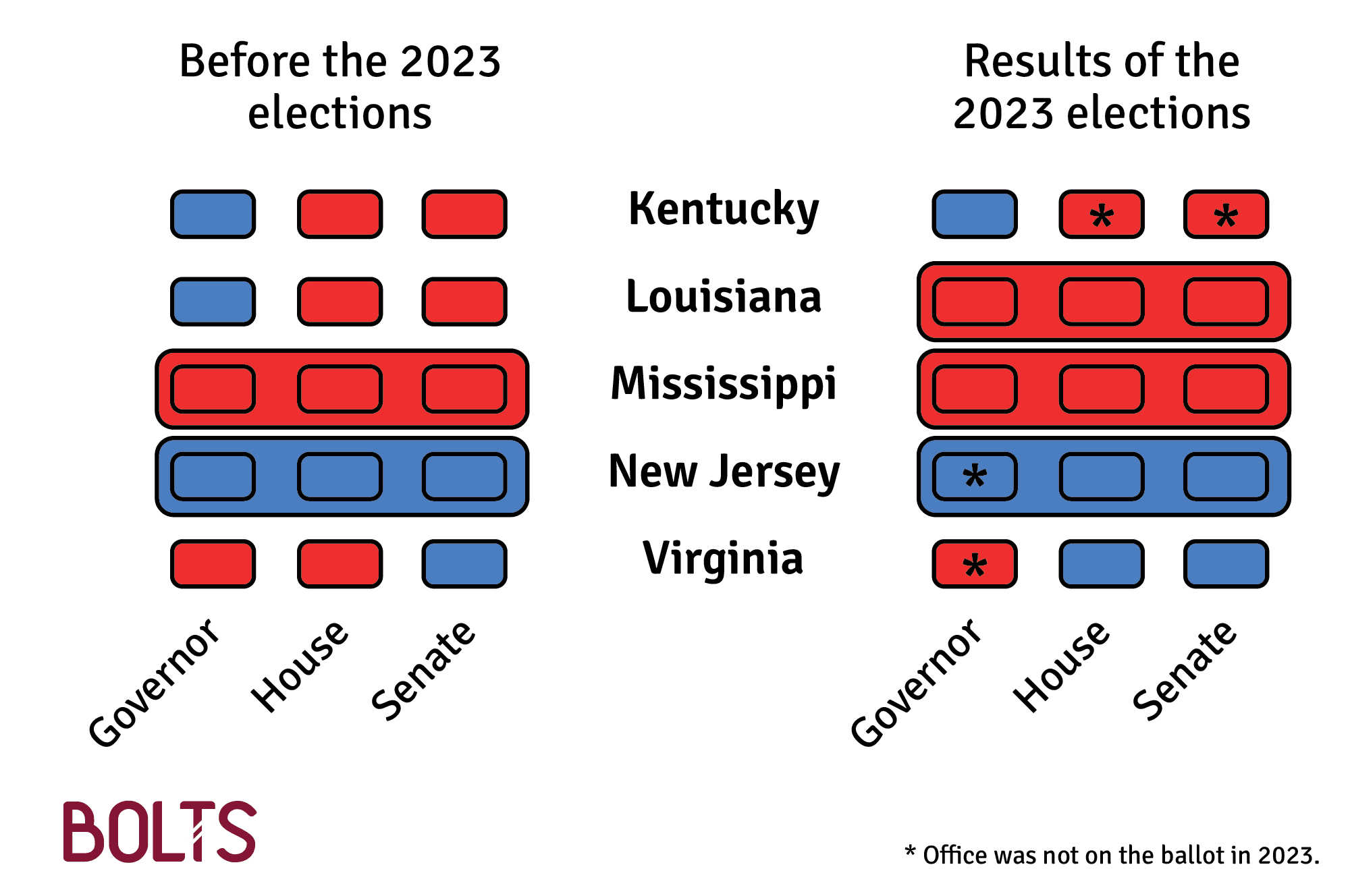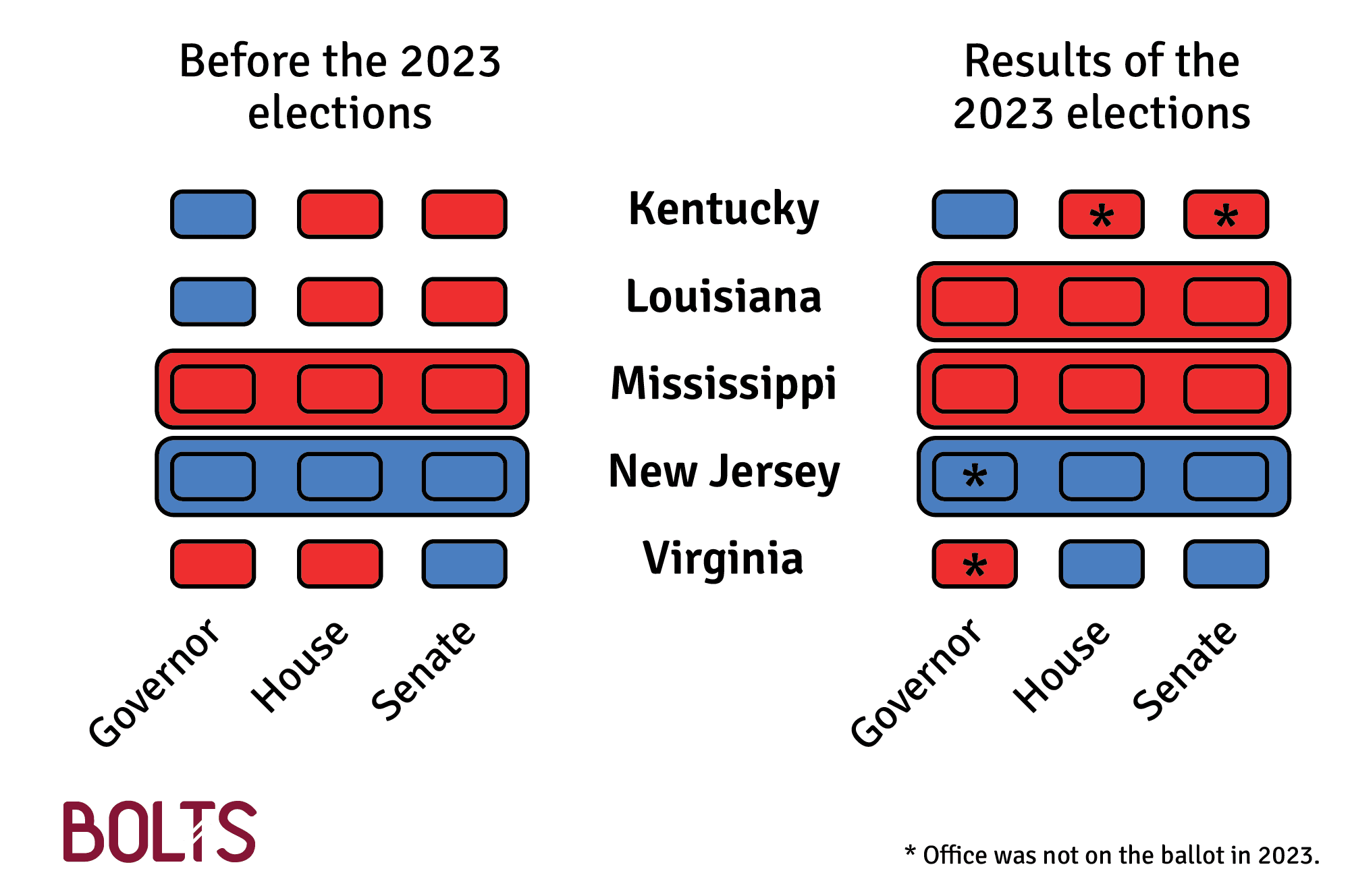Abortion Rights Power Democratic Wins in Kentucky and Virginia
Voters decided who will run the state government in four states on Tuesday, with Democrats also making gains in New Jersey and the GOP keeping hold of Mississippi.
Daniel Nichanian | November 8, 2023


Kentucky’s Democratic Governor Andy Beshear seized on the issue of abortion in his reelection bid this year, attacking his Republican challenger for supporting the state’s harsh abortion ban.
Beshear emerged victorious on Tuesday, securing a second term by defeating Attorney General Daniel Cameron by 5 percentage points as of publication, the same margin by which Kentuckians rejected an anti-abortion constitutional amendment last fall.
Glenn Youngkin, Virginia’s Republican governor, made the inverse gamble this fall that he could convince Virginians to hand the keys to their state government to his party even if he told them that the GOP would introduce new restrictions on abortion in the commonwealth. He proposed a new ban after 15 weeks, similar to some congressional Republicans’ proposal.
But Virginians on Tuesday rejected Youngkin’s offer and Democrats, who campaigned hard on promising to protect abortion rights, won both chambers of the legislature by defending their majority in the Senate and gaining control of the state House from Republicans.
With these results, Democrats held off major Republican efforts to take full control of the state governments of Kentucky and Virginia, a replay of the GOP’s disappointment in the fall of 2022 when it failed to capitalize on the traditional gains for an out-of-power party.
Republicans’ setbacks last year were widely attributed to the unpopularity of the U.S. Supreme Court’s decision to overturn Roe vs. Wade, and voters reaffirmed various times throughout 2023 that reproductive rights remain a motivating issue.
Proponents of reproductive rights on Tuesday also secured a decisive win in Ohio, where voters overwhelmingly approved a constitutional amendment to establish a right to abortion. And Democrats also prevailed in a critical state supreme court election in Pennsylvania after they assailed the Republican nominee for signaling support for restrictions.
Beyond Kentucky and Virginia, two other states were electing their state governments on Tuesday, and both held to their usual partisan form.
In New Jersey, Democrats easily defended their majorities in both legislative chambers, expanding their majorities despite GOP giddiness this fall, so they will retain full control of the state government for at least the next two years.
Republicans got their best result of election night in Mississippi, where they will keep control of the state government thanks to Republican Governor Tate Reeves’ reelection victory. The GOP did score a decisive victory last month in Louisiana, which holds its state elections in October, as they flipped the governorship to win control of the state for the first time in 2015.


Republicans will exit the 2023 elections with trifectas in 23 states, and Democrats will enjoy trifectas in 17 states. Ten states will have split state governments. Most states will elect their lawmakers or governors next state, opening the door to further upheaval in the shadow of the presidential race.
Below is Bolts’ rundown of the results in each of the four states that selected their state governments on Tuesday. (Bolts covered the Louisiana elections last month, and will continue covering the results of Tuesday’s local elections throughout the week.)
Kentucky: Democrats keep a foothold in a ruby red state
Beshear squeaked into the governor’s mansion in 2019, ousting a Republican incumbent by less than one percentage point. But he won reelection on Tuesday by a more comfortable margin, 52.5 to 47.5 percent.
He enjoyed wide popularity during his first term, and his win on Tuesday was powered by heavy support in the state’s urban cores, and slimmer losses than four years ago in rural Kentucky.
Cameron did his best to tie the race to national politics, pointing to Trump’s endorsement. He also accused Democrats of not supporting law enforcement and vowed to champion stiffer criminal penalties, a familiar campaign strategy for his party. As attorney general, he was responsible for the decision to not file charges against the police officers who killed Breonna Taylor in Louisville. But Cameron ran far behind the GOP’s other statewide candidates, all of whom prevailed easily for races such as attorney general and secretary of state.
The legislature was not up for election on Tuesday, though, and the GOP will retain their large majorities in both chambers, with which they’ve routinely overturned Beshear’s vetoes during his first term, for instance ramming through a ban on gender-affirming care for minors and major abortion restrictions earlier this year.
Beshear has tried to make up for his de facto inability to veto Republican bills by occasionally flexing his executive authority, drawing some lawsuits and retaliation from Republicans. Within days of coming into office in 2019, he issued an executive order restoring the voting rights of hundreds of thousands of residents with felony convictions who until then had lost their right to vote for life. His reelection virtually guarantees that this executive order will remain in place, and in fact is likely to grow calls from voting rights activists who are pushing him to go further, ending the practice of lifetime disenfranchisement altogether as in the case in most states.
Virginia: Democrats grab full control of the legislature
Youngkin wasn’t on the ballot this year, but he banked on a strong showing by Republicans in the legislative election to deliver him more power and to solidify his national reputation. He spent months recruiting candidates and enforcing strict campaign messaging to pick up the few seats in the state Senate that would deliver his party full control of the state government. He proposed restricting abortion to 15 weeks, calling this a “reasonable” compromise in the wake of the Dobbs decision, and assailed Democrats for supporting criminal justice reforms.
Instead, it’s Democrats who made major inroads on Tuesday. Not only did they defend their edge in the state Senate, but they also gained at least six seats in the state House, costing Youngkin some of his political allies and flipping the chamber.
Over the last two years, Republicans in the state House had teed up legislation that would shift the state to the right, including new limitations on local criminal justice reforms and new restrictions on ballot access, such as repealing same-day voter registration and getting rid of ballot drop boxes. Such proposals will remain dead on arrival, as does Youngkin’s project of introducing new abortion restrictions.
Still, Youngkin, who cannot run for reelection in 2025, retains use of executive power; earlier this year, he used that authority to drastically curtail the voting rights of people with felony convictions.
Mississippi: Republicans hold off Democratic hopes for an upset
Mississippi is one of the nation’s poorest states, and it’s also one of only ten that has refused to expand Medicaid to cover more lower-income residents, as provided by the Affordable Care Act. Democrat Brandon Presley made Medicaid into a major campaign issue this fall as he took on the state’s Republican Governor Tate Reeves, a staunch opponent of expansion. Presley, a commissioner on Mississippi’s public utility commission and a cousin of Elvis Presley, also zeroed in on a scandal involving tens of millions of dollars of misspent welfare funds that has engulfed Reeves, making Democrats hope for their first gubernatorial win in decades.
But Mississippi’s Republican bent proved too large for Presley to overcome. Black Mississippians vote overwhelmingly Democratic, but white residents vote Republican by a consistently huge margin. Reeves secured a second term on Tuesday, leading by five percentage points as of publication.
Republicans also easily kept their majorities in the state legislature. They were running unopposed in nearly the majority of districts to start with.
Tuesday’s contests were beset by issues at polling locations in Hinds County, home to Jackson, which is a majority-Black county and the state’s most populous. They were also held in the shadow of a short-lived decision by a federal court to strike down the state’s exceptionally harsh felony disenfranchisement rules, which disproportionately affects Black residents. The ruling in August offered a glimmer of hope to disenfranchised Mississippians but the Fifth Circuit of Appeals ended up vacating it, once again shutting off polling places to hundreds of thousands of Mississippians.
New Jersey: Democrats put 2021 behind them
Democrats barely held onto their trifecta in New Jersey in 2021, when a surprisingly-strong Republican Party gained seven legislative seats and came within close striking distance of the governorship. This year, with all legislative seats up for grabs, Republicans hoped to make further gains on Tuesday—perhaps even breaking up Democrats’ legislative majorities for the first time since 2001—by rallying voters under the battle cry of parental rights and taking issue with school policies that seek to shield transgender students.
Instead, Democrats easily maintained control of both chambers. Far from losing seats, they made up ground they lost two years ago; they have flipped five Assembly seats as of publication. Democrats also ousted Republican Senator Edward Dunn, whose shock victory against the chamber’s Democratic president in 2021 came to encapsulate their party’s poor results that year.
Continued Democratic control over New Jersey will test the at times frosty relationship between legislative leaders and Governor Phil Murphy, who was not on the ballot on Tuesday. Progressive priorities like same-day voter registration have stalled in the legislature.
And don’t forget about New Hampshire
By winning New Hampshire’s sole legislative race in a special election on Tuesday, Democrat Paige Beauchemin pulled her party within just one seat of erasing the GOP’s majority in the state House. Democrats now have 197 seats to the GOP’s 198.
In the never-ending election cycle, watch out for more special elections in coming months—two seats are already vacant—that will test whether the GOP retains a trifecta in this state.
Stay up-to-date
Now is the best time to support Bolts
NewsMatch is matching all donations (up to $1,000) through the end of the year. Support our nonprofit newsroom today to increase the impact of your gift.


